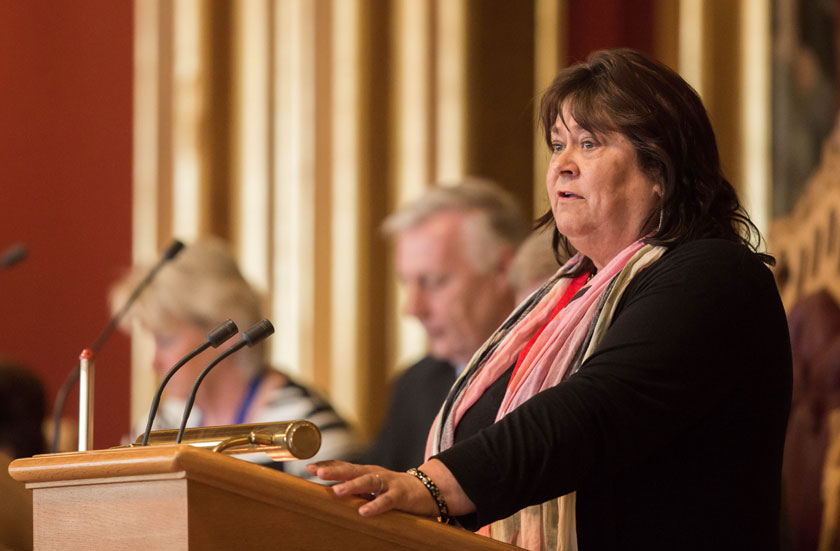
Sonja Mandt, Head of the Storting’s Delegation to the Nordic Council, during the theme session in Oslo on 19th April 2016. Photo: Morten Brakestad/norden.org.
An arena for discourse and common solutions
The Nordic Council gathered in the Storting for the 2016 Theme Session on Tuesday 19th April.
See photos of the theme session on Flickr. All photos may be freely used provided they are correctly credited.
Click here for a video recording of the theme session.
“We are all proud of the agreement on passport-free travel. Border controls are permitted under special circumstances, such as today’s refugee crisis, but a common labour market is of great value to the Nordic region. This is why we must do our best to take this collaboration further rather than to set up permanent obstacles,” Sonja Mandt said at the theme session. Ms Mandt is Head of the Norwegian Delegation to the Nordic Council, which consists of 20 Members of Parliament.
Freedom of movement a shared value
A much repeated message throughout the session was how important the Nordic Council is as an arena for discourse and common solutions. The theme session opened with a topical debate on Nordic border controls.
For more than 60 years there has been freedom of movement within the Nordic Region. Yet on 1st January 2016 Denmark introduced passport controls at its border with Sweden. This is one of several examples of temporary border controls being set up as a consequence of the ongoing refugee crisis in Europe. For many in the Nordic region it is a highly unusual state of affairs.
Anne Berner, the Finnish Minister for Nordic Co-operation, was the first to speak in the debate. She made the point that freedom of movement is one of the cornerstones of Nordic collaboration, which is why the setting up of internal border controls has such huge significance. Yet she also reminded those gathered that Nordic co-operation remains strong.
“The Nordic countries are like a family,” Ms Berner said.
The solution transcends the Nordic region
Before the theme session, the Ministers for Nordic Co-operation had a separate meeting in the Storting. Here it was agreed to work towards maintaining freedom of movement and passport-free travel in the Nordic area. However, a number of the parliamentarians present underlined the point that such a solution cannot be reached by the Nordic countries alone, but must be achieved at a European and global level.
“Right now, Nordic border controls are necessary, but we must do our best to make sure that these are temporary measures only. The efficiency of the Schengen Agreement must be improved, because the road back to full Nordic passport-free travel goes via the EU and its institutions,” emphasized Michael Tetzschner, Deputy Head of the Storting’s Delegation.
Best for children and young people
After the topical debate, Elisabeth Aspaker, Norway’s Minister for Nordic Co-operation, presented the Nordic Council of Ministers’ new strategy for children and young people in the Nordic region. Its vision is to make the Nordic region the best place in the world to grow up. The strategy has three target areas: support for vulnerable children and young people, including refugees; support for civil society; and increased knowledge and skills sharing.
One of the Storting’s delegation members, Bente Stein Mathisen, is the chair of the Nordic Council’s Committee for Welfare in the Nordic Region. She emphasized that the committee welcomes the Council of Ministers’ new strategy, but would like to see the establishment of a new Nordic minister for children and youth.
Increased observer status for Sami parliamentarians
Another item on the agenda during the theme session was the issue of collaboration with the Sami Parliamentary Council. The Nordic Council debated how and to what extent cooperation may be strengthened. Several of the members of the Storting’s delegation, among them Torgeir Knag Fylkesnes and Gunvor Eldegard, spoke in favour of the proposal. The three Sami parliaments in Norway, Sweden and Finland have been accorded increased observer status in the Nordic Council. In practice, this means that Sami representatives now have the right to take part in committee meetings in the Nordic Council when questions that touch on Sami affairs are under consideration.
Broad regional collaboration
The Nordic Council is the official body for co-operation between the parliaments of Denmark, Finland, Iceland, Norway and Sweden, along with the three autonomous territories of the Faroe Islands, Greenland, and Åland. The Council was formed in 1952, and Norway is one of its four founder members.
The Nordic Council works to further Nordic interests and values. Its overriding goal is “a strong Nordic Region in a strong Europe”, with co-operation having political, economic and cultural aspects. Headed by a Presidium, the Nordic Council comprises 87 parliamentarians from the different Nordic nations.
The Nordic Council convenes for two annual sessions: a main session in the autumn and a theme session every spring. The next main session will be held in the Folketing in Copenhagen.
Also of interest
– Nordic co-operation more important than ever
Last updated: 21.04.2016 13:37